Evaluating Negligence: A Case Study of Tamara's Injury at Aldi Store
VerifiedAdded on 2023/06/07
|5
|1388
|261
Case Study
AI Summary
This case study examines whether Aldi Supermarkets can be sued for negligence following an incident where Tamara slipped on spilled ice cream and sustained serious injuries. The analysis considers the elements necessary to establish negligence, including duty of care, breach of duty, causation, and damages. It explores whether Aldi had a duty of care towards Tamara, whether this duty was breached, and whether Tamara's injuries were a direct result of that breach. The study also considers potential defenses Aldi might raise, such as contributory negligence on Tamara's part or the supermarket's regular cleaning schedule. Ultimately, it assesses the likelihood of Tamara successfully suing Aldi for negligence based on the application of relevant legal principles and case law. Desklib provides access to similar solved assignments and past papers for students.
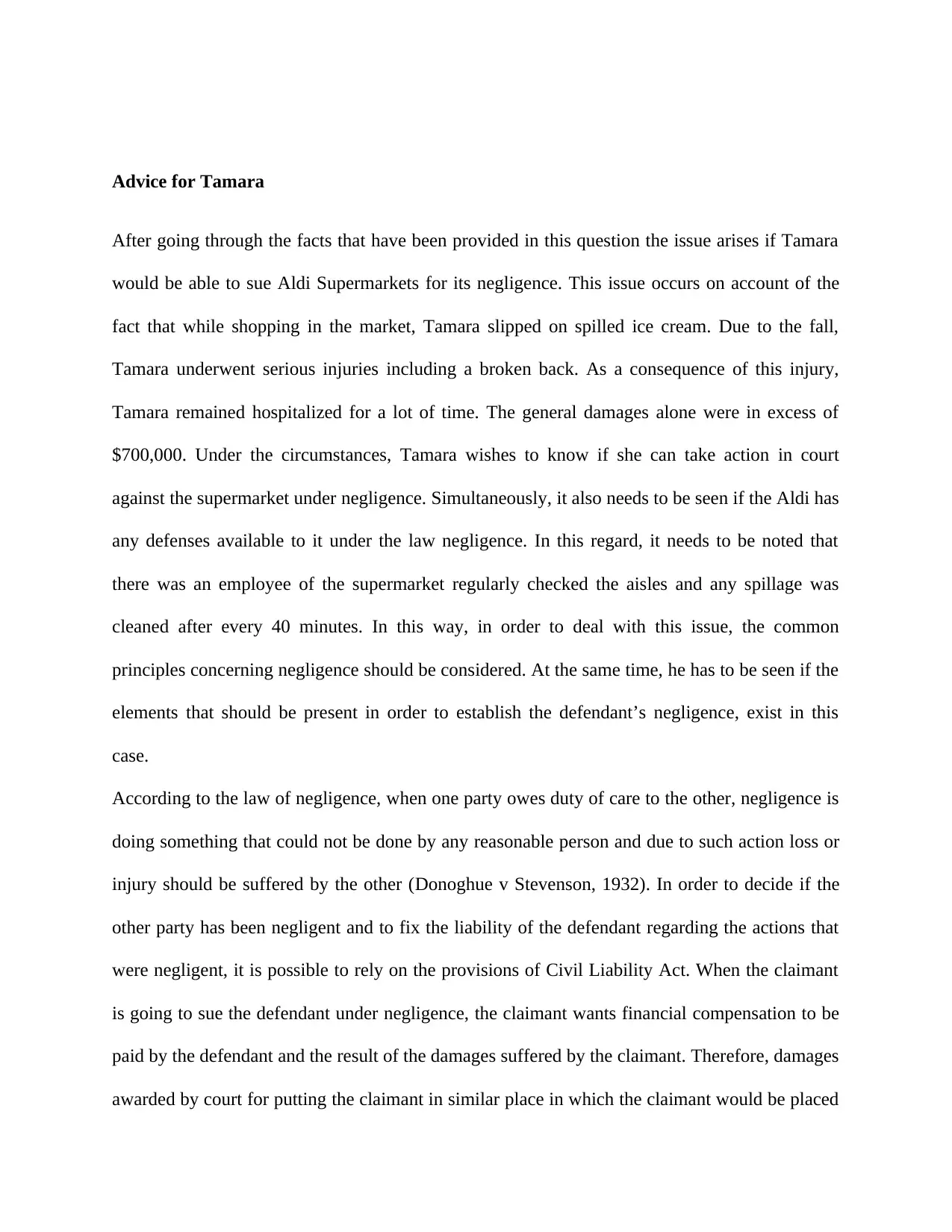
Advice for Tamara
After going through the facts that have been provided in this question the issue arises if Tamara
would be able to sue Aldi Supermarkets for its negligence. This issue occurs on account of the
fact that while shopping in the market, Tamara slipped on spilled ice cream. Due to the fall,
Tamara underwent serious injuries including a broken back. As a consequence of this injury,
Tamara remained hospitalized for a lot of time. The general damages alone were in excess of
$700,000. Under the circumstances, Tamara wishes to know if she can take action in court
against the supermarket under negligence. Simultaneously, it also needs to be seen if the Aldi has
any defenses available to it under the law negligence. In this regard, it needs to be noted that
there was an employee of the supermarket regularly checked the aisles and any spillage was
cleaned after every 40 minutes. In this way, in order to deal with this issue, the common
principles concerning negligence should be considered. At the same time, he has to be seen if the
elements that should be present in order to establish the defendant’s negligence, exist in this
case.
According to the law of negligence, when one party owes duty of care to the other, negligence is
doing something that could not be done by any reasonable person and due to such action loss or
injury should be suffered by the other (Donoghue v Stevenson, 1932). In order to decide if the
other party has been negligent and to fix the liability of the defendant regarding the actions that
were negligent, it is possible to rely on the provisions of Civil Liability Act. When the claimant
is going to sue the defendant under negligence, the claimant wants financial compensation to be
paid by the defendant and the result of the damages suffered by the claimant. Therefore, damages
awarded by court for putting the claimant in similar place in which the claimant would be placed
After going through the facts that have been provided in this question the issue arises if Tamara
would be able to sue Aldi Supermarkets for its negligence. This issue occurs on account of the
fact that while shopping in the market, Tamara slipped on spilled ice cream. Due to the fall,
Tamara underwent serious injuries including a broken back. As a consequence of this injury,
Tamara remained hospitalized for a lot of time. The general damages alone were in excess of
$700,000. Under the circumstances, Tamara wishes to know if she can take action in court
against the supermarket under negligence. Simultaneously, it also needs to be seen if the Aldi has
any defenses available to it under the law negligence. In this regard, it needs to be noted that
there was an employee of the supermarket regularly checked the aisles and any spillage was
cleaned after every 40 minutes. In this way, in order to deal with this issue, the common
principles concerning negligence should be considered. At the same time, he has to be seen if the
elements that should be present in order to establish the defendant’s negligence, exist in this
case.
According to the law of negligence, when one party owes duty of care to the other, negligence is
doing something that could not be done by any reasonable person and due to such action loss or
injury should be suffered by the other (Donoghue v Stevenson, 1932). In order to decide if the
other party has been negligent and to fix the liability of the defendant regarding the actions that
were negligent, it is possible to rely on the provisions of Civil Liability Act. When the claimant
is going to sue the defendant under negligence, the claimant wants financial compensation to be
paid by the defendant and the result of the damages suffered by the claimant. Therefore, damages
awarded by court for putting the claimant in similar place in which the claimant would be placed
Paraphrase This Document
Need a fresh take? Get an instant paraphrase of this document with our AI Paraphraser
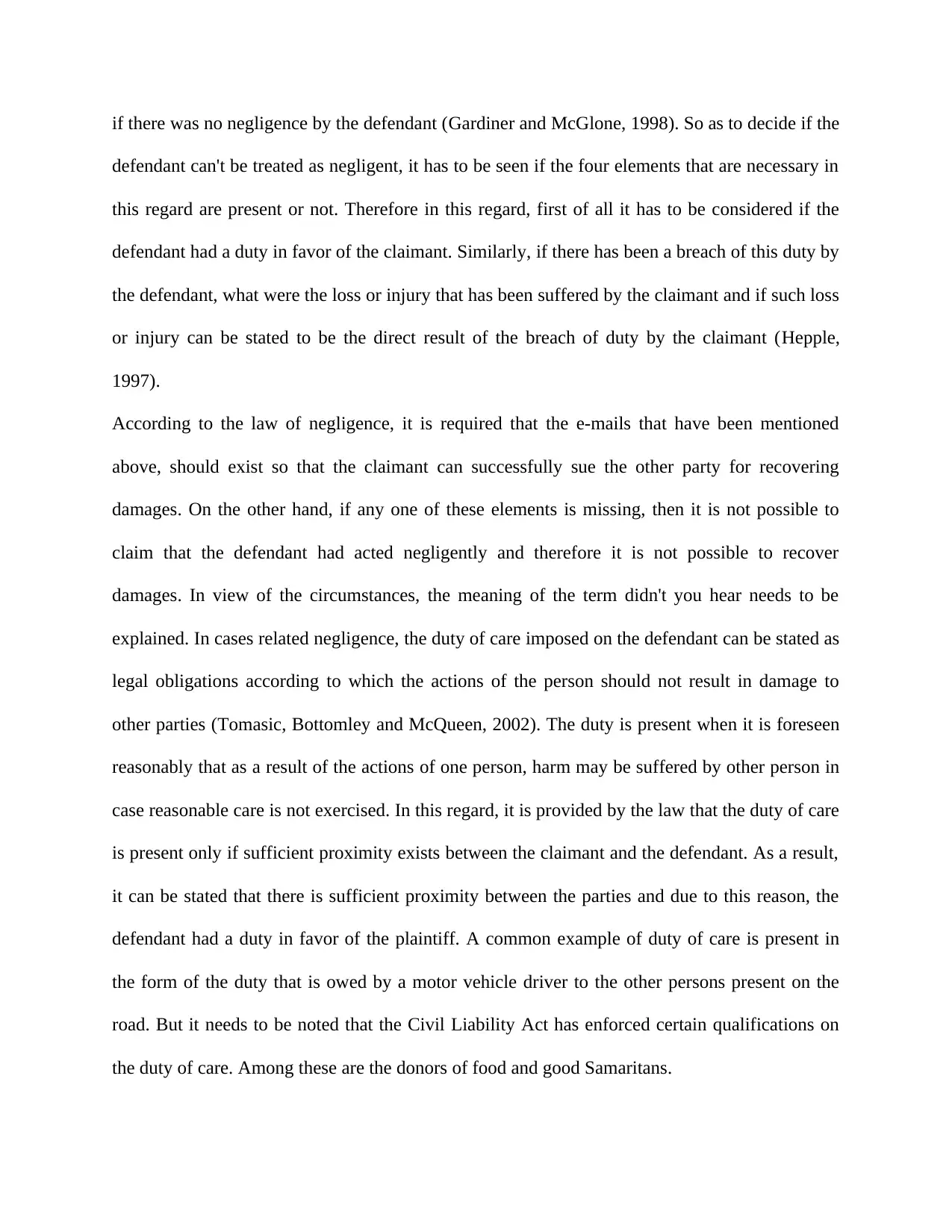
if there was no negligence by the defendant (Gardiner and McGlone, 1998). So as to decide if the
defendant can't be treated as negligent, it has to be seen if the four elements that are necessary in
this regard are present or not. Therefore in this regard, first of all it has to be considered if the
defendant had a duty in favor of the claimant. Similarly, if there has been a breach of this duty by
the defendant, what were the loss or injury that has been suffered by the claimant and if such loss
or injury can be stated to be the direct result of the breach of duty by the claimant (Hepple,
1997).
According to the law of negligence, it is required that the e-mails that have been mentioned
above, should exist so that the claimant can successfully sue the other party for recovering
damages. On the other hand, if any one of these elements is missing, then it is not possible to
claim that the defendant had acted negligently and therefore it is not possible to recover
damages. In view of the circumstances, the meaning of the term didn't you hear needs to be
explained. In cases related negligence, the duty of care imposed on the defendant can be stated as
legal obligations according to which the actions of the person should not result in damage to
other parties (Tomasic, Bottomley and McQueen, 2002). The duty is present when it is foreseen
reasonably that as a result of the actions of one person, harm may be suffered by other person in
case reasonable care is not exercised. In this regard, it is provided by the law that the duty of care
is present only if sufficient proximity exists between the claimant and the defendant. As a result,
it can be stated that there is sufficient proximity between the parties and due to this reason, the
defendant had a duty in favor of the plaintiff. A common example of duty of care is present in
the form of the duty that is owed by a motor vehicle driver to the other persons present on the
road. But it needs to be noted that the Civil Liability Act has enforced certain qualifications on
the duty of care. Among these are the donors of food and good Samaritans.
defendant can't be treated as negligent, it has to be seen if the four elements that are necessary in
this regard are present or not. Therefore in this regard, first of all it has to be considered if the
defendant had a duty in favor of the claimant. Similarly, if there has been a breach of this duty by
the defendant, what were the loss or injury that has been suffered by the claimant and if such loss
or injury can be stated to be the direct result of the breach of duty by the claimant (Hepple,
1997).
According to the law of negligence, it is required that the e-mails that have been mentioned
above, should exist so that the claimant can successfully sue the other party for recovering
damages. On the other hand, if any one of these elements is missing, then it is not possible to
claim that the defendant had acted negligently and therefore it is not possible to recover
damages. In view of the circumstances, the meaning of the term didn't you hear needs to be
explained. In cases related negligence, the duty of care imposed on the defendant can be stated as
legal obligations according to which the actions of the person should not result in damage to
other parties (Tomasic, Bottomley and McQueen, 2002). The duty is present when it is foreseen
reasonably that as a result of the actions of one person, harm may be suffered by other person in
case reasonable care is not exercised. In this regard, it is provided by the law that the duty of care
is present only if sufficient proximity exists between the claimant and the defendant. As a result,
it can be stated that there is sufficient proximity between the parties and due to this reason, the
defendant had a duty in favor of the plaintiff. A common example of duty of care is present in
the form of the duty that is owed by a motor vehicle driver to the other persons present on the
road. But it needs to be noted that the Civil Liability Act has enforced certain qualifications on
the duty of care. Among these are the donors of food and good Samaritans.
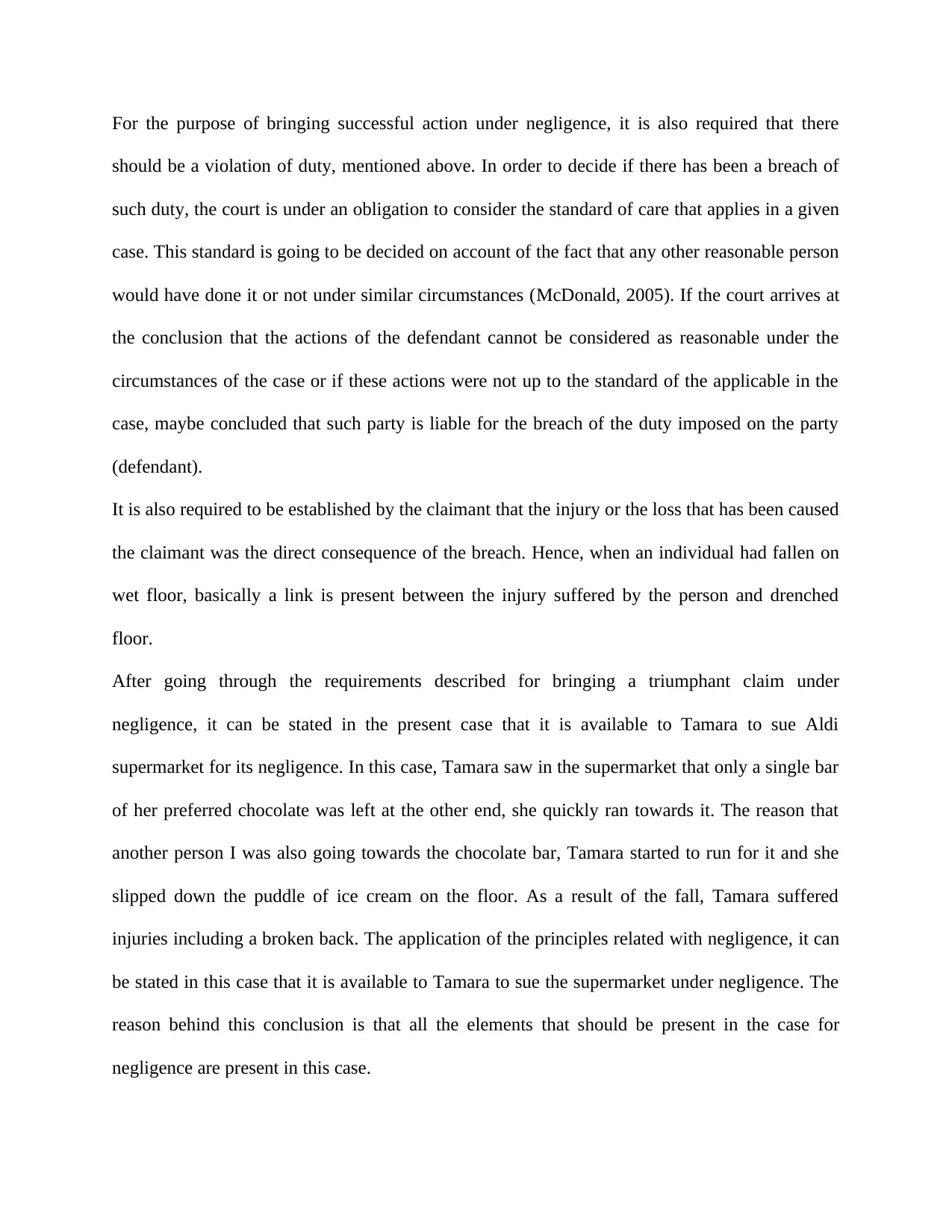
For the purpose of bringing successful action under negligence, it is also required that there
should be a violation of duty, mentioned above. In order to decide if there has been a breach of
such duty, the court is under an obligation to consider the standard of care that applies in a given
case. This standard is going to be decided on account of the fact that any other reasonable person
would have done it or not under similar circumstances (McDonald, 2005). If the court arrives at
the conclusion that the actions of the defendant cannot be considered as reasonable under the
circumstances of the case or if these actions were not up to the standard of the applicable in the
case, maybe concluded that such party is liable for the breach of the duty imposed on the party
(defendant).
It is also required to be established by the claimant that the injury or the loss that has been caused
the claimant was the direct consequence of the breach. Hence, when an individual had fallen on
wet floor, basically a link is present between the injury suffered by the person and drenched
floor.
After going through the requirements described for bringing a triumphant claim under
negligence, it can be stated in the present case that it is available to Tamara to sue Aldi
supermarket for its negligence. In this case, Tamara saw in the supermarket that only a single bar
of her preferred chocolate was left at the other end, she quickly ran towards it. The reason that
another person I was also going towards the chocolate bar, Tamara started to run for it and she
slipped down the puddle of ice cream on the floor. As a result of the fall, Tamara suffered
injuries including a broken back. The application of the principles related with negligence, it can
be stated in this case that it is available to Tamara to sue the supermarket under negligence. The
reason behind this conclusion is that all the elements that should be present in the case for
negligence are present in this case.
should be a violation of duty, mentioned above. In order to decide if there has been a breach of
such duty, the court is under an obligation to consider the standard of care that applies in a given
case. This standard is going to be decided on account of the fact that any other reasonable person
would have done it or not under similar circumstances (McDonald, 2005). If the court arrives at
the conclusion that the actions of the defendant cannot be considered as reasonable under the
circumstances of the case or if these actions were not up to the standard of the applicable in the
case, maybe concluded that such party is liable for the breach of the duty imposed on the party
(defendant).
It is also required to be established by the claimant that the injury or the loss that has been caused
the claimant was the direct consequence of the breach. Hence, when an individual had fallen on
wet floor, basically a link is present between the injury suffered by the person and drenched
floor.
After going through the requirements described for bringing a triumphant claim under
negligence, it can be stated in the present case that it is available to Tamara to sue Aldi
supermarket for its negligence. In this case, Tamara saw in the supermarket that only a single bar
of her preferred chocolate was left at the other end, she quickly ran towards it. The reason that
another person I was also going towards the chocolate bar, Tamara started to run for it and she
slipped down the puddle of ice cream on the floor. As a result of the fall, Tamara suffered
injuries including a broken back. The application of the principles related with negligence, it can
be stated in this case that it is available to Tamara to sue the supermarket under negligence. The
reason behind this conclusion is that all the elements that should be present in the case for
negligence are present in this case.
⊘ This is a preview!⊘
Do you want full access?
Subscribe today to unlock all pages.

Trusted by 1+ million students worldwide
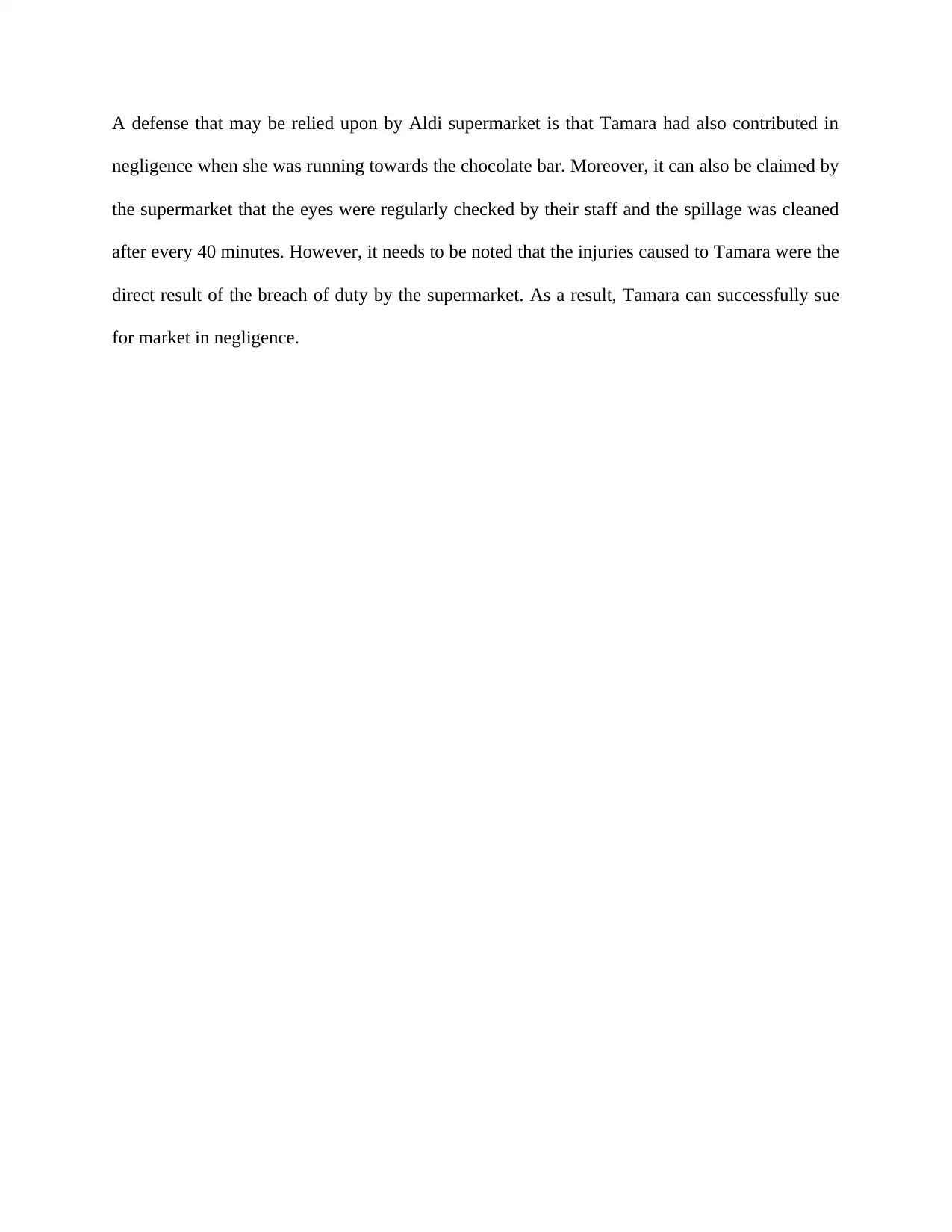
A defense that may be relied upon by Aldi supermarket is that Tamara had also contributed in
negligence when she was running towards the chocolate bar. Moreover, it can also be claimed by
the supermarket that the eyes were regularly checked by their staff and the spillage was cleaned
after every 40 minutes. However, it needs to be noted that the injuries caused to Tamara were the
direct result of the breach of duty by the supermarket. As a result, Tamara can successfully sue
for market in negligence.
negligence when she was running towards the chocolate bar. Moreover, it can also be claimed by
the supermarket that the eyes were regularly checked by their staff and the spillage was cleaned
after every 40 minutes. However, it needs to be noted that the injuries caused to Tamara were the
direct result of the breach of duty by the supermarket. As a result, Tamara can successfully sue
for market in negligence.
Paraphrase This Document
Need a fresh take? Get an instant paraphrase of this document with our AI Paraphraser
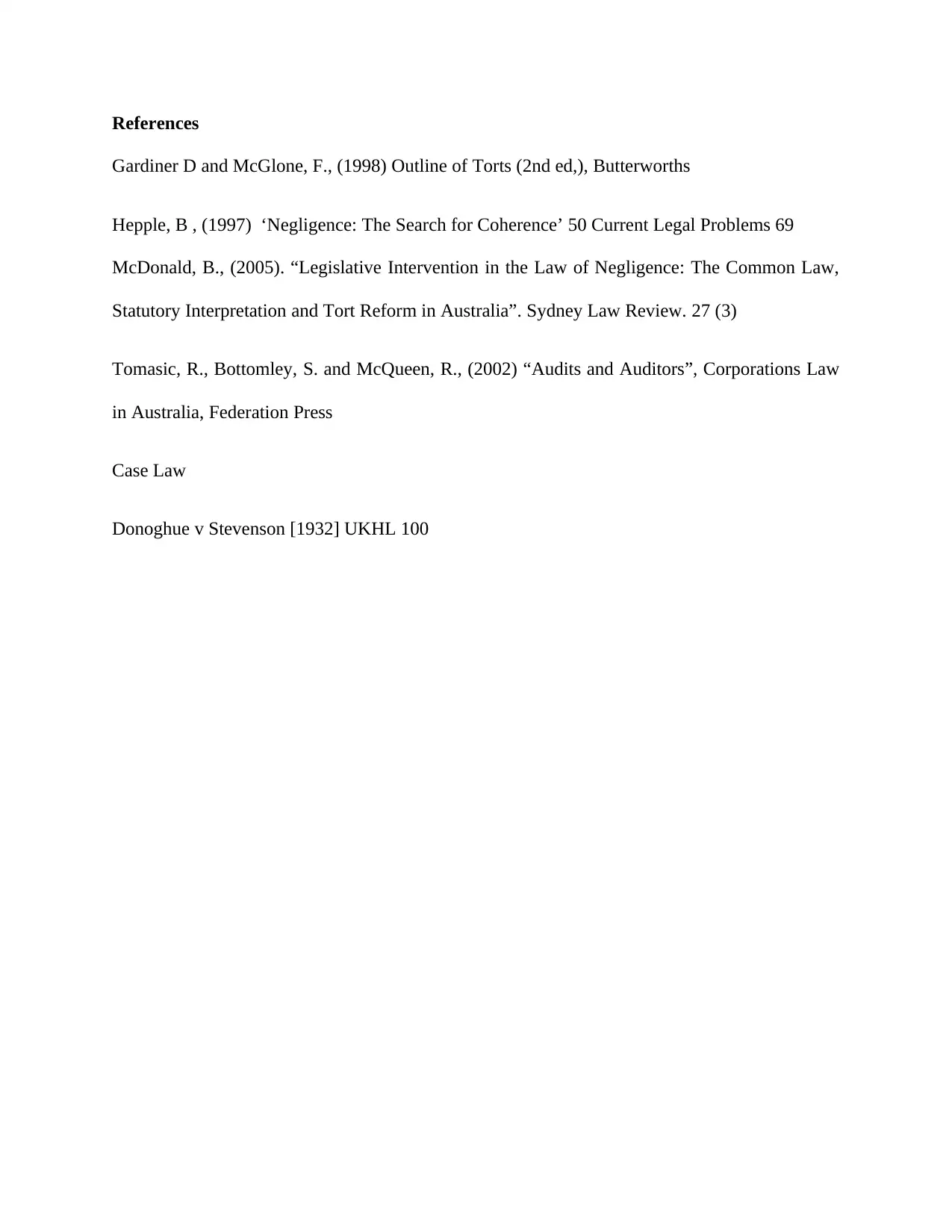
References
Gardiner D and McGlone, F., (1998) Outline of Torts (2nd ed,), Butterworths
Hepple, B , (1997) ‘Negligence: The Search for Coherence’ 50 Current Legal Problems 69
McDonald, B., (2005). “Legislative Intervention in the Law of Negligence: The Common Law,
Statutory Interpretation and Tort Reform in Australia”. Sydney Law Review. 27 (3)
Tomasic, R., Bottomley, S. and McQueen, R., (2002) “Audits and Auditors”, Corporations Law
in Australia, Federation Press
Case Law
Donoghue v Stevenson [1932] UKHL 100
Gardiner D and McGlone, F., (1998) Outline of Torts (2nd ed,), Butterworths
Hepple, B , (1997) ‘Negligence: The Search for Coherence’ 50 Current Legal Problems 69
McDonald, B., (2005). “Legislative Intervention in the Law of Negligence: The Common Law,
Statutory Interpretation and Tort Reform in Australia”. Sydney Law Review. 27 (3)
Tomasic, R., Bottomley, S. and McQueen, R., (2002) “Audits and Auditors”, Corporations Law
in Australia, Federation Press
Case Law
Donoghue v Stevenson [1932] UKHL 100
1 out of 5
Related Documents
Your All-in-One AI-Powered Toolkit for Academic Success.
+13062052269
info@desklib.com
Available 24*7 on WhatsApp / Email
![[object Object]](/_next/static/media/star-bottom.7253800d.svg)
Unlock your academic potential
Copyright © 2020–2026 A2Z Services. All Rights Reserved. Developed and managed by ZUCOL.




